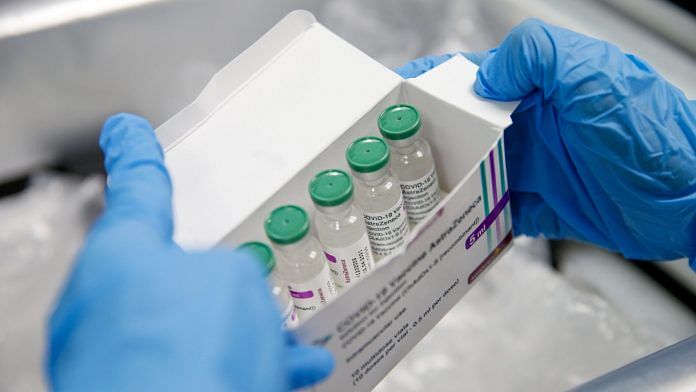New Delhi: The first dose of the Oxford-AstraZeneca vaccine — available in India under the name of Covishield — was linked to a slightly increased risk of a drop in platelet count and blood clots in arteries, researchers have found.
The researchers said that public health authorities should inform their jurisdictions of these relatively small increased risks associated with the ChAdOx1 vaccine.
No such risk was associated with the Pfizer–BioNTech mRNA vaccine, also known as the BNT162b2 vaccine.
In the study published in the journal Nature Medicine, researchers looked at data from the vaccinated population in Scotland.
Between 8 December 2020 and 14 April 2021, 2.53 million people received their first doses of Covid-19 vaccines in Scotland. This accounts for nearly 57.5 per cent of the adult population.
Of these, 1.71 million people were vaccinated with the ChAdOx1 vaccine, and 0.82 million people were vaccinated with the BNT162b2 vaccine, with fewer than 10,000 people receiving the mRNA-1273 (Moderna) vaccine.
The team from the University of Edinburgh found that for every 100,000 people vaccinated, there were 1.3 excess events of thrombocytopenia than what is expected in the population in the six days following vaccination with the AstraZeneca vaccine.
Thrombocytopenia is a condition in which there is a drop in the count of blood platelets — colourless blood cells that help blood clot.
Also read: Good news from vaccine study: Both work well, Covishield produces more antibodies than Covaxin
Low platelet count, blood clots
Researchers also found an increased risk of Immune thrombocytopenic purpura (ITP) — a blood disorder characterised by a decrease in the number of platelets — which often occurs when the immune system mistakenly starts to attack platelets. The risk of ITP was slightly higher — 1.13 more cases than expected for every 100,000 vaccinated — upto 27 days of receiving the first dose of the AstraZeneca vaccine.
According to the study, patients who had ITP after ChAdOx1 vaccination compared to those who had ITP without vaccination tended to be older, more likely to have at least one clinical risk condition and to have been in hospital at the time of the event.
The study also found that 48 per cent of patients who developed ITP after a dose of ChAdOx1 had prior prescriptions that could induce the condition.
The researchers found that apart from low platelet count, the first shot of the AstraZeneca vaccine was also linked to a small increase in risk of blood clots in arteries up to 20 days after the first dose of the AstraZeneca vaccine.
For the adult population under the age of 39, there were 5.87 more cases of blood clots than expected for every 100,000 people vaccinated. For those between the ages of 40 to 59, this metric rose to 31.35 cases per 100,000 doses.
The risk of such adverse events was linked to increasing age (especially over 60), male sex, having comorbidities such as heart failure, coronary heart disease, peripheral vascular disease, severe mental illness, sickle cell disease, prior stroke, type 1 and 2 diabetes and chronic kidney disease, very high blood pressure and smoking.
The research is one of the first real-world studies identifying all vaccinated individuals within a national population and assessing Covid-19 vaccine-related adverse events.
“Given these small increased risks for ChAdOx1, alternative vaccines for individuals at low COVID-19 risk might be warranted when supply allows,” the researchers wrote in their study.
Also read: Simple antibody test can help look for blood clots after Covishield vaccine, study says



